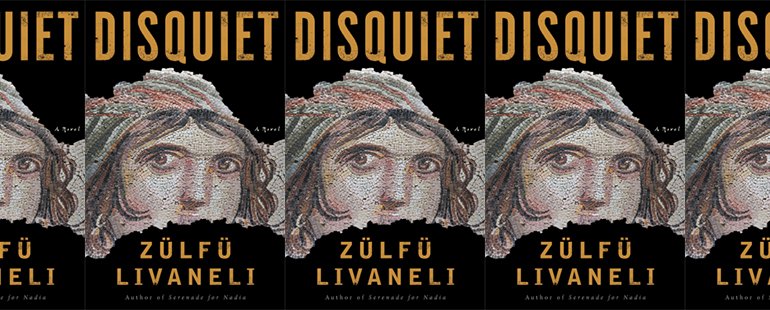Cruel Compassion in Zülfü Livaneli’s Disquiet

Disquiet
Zülfü Livaneli
Other Press | June 29, 2021
In Zülfü Livaneli’s Disquiet, translated from the Turkish by Brendan Freely, the narrator Ibrahim says, “I want to remember that I’m a human being.” To remember his humanity, Ibrahim believes he must help Meleknaz, the fiancée of his deceased friend, Hussein. His desire to help seems harmless at first, but as the novel progresses, his desire becomes increasingly disquieting: he tracks down Meleknaz and stalks her through Istanbul’s streets to discover where she lives. When Meleknaz tells him that “compassion is a part of cruelty,” it’s clear that Ibrahim’s compassion is directly connected to the book’s cruelty—the Ezidi genocide that took place in northern Syria from 2015 to 2019.
Much of the novel interrogates the connections such poles—compassion or cruelty, good or evil, angel or devil, East or West, human or inhuman. Ibrahim notices these extremes after he returns to his hometown of Mardin, in southeastern Turkey on the border with Syria, at the beginning of the book after learning Hussein was murdered. In Mardin, he revisits old friends and their family to listen to their stories—told in monologue—about how compassionate Hussein fell in love with “the devil” Meleknaz as he made his medical rounds in the Syrian refugee camps, abandoning his beautiful fiancé for her. On top of that, people believe that Meleknaz’s marriage was doomed from the start, as both of their religions, his, Muslim, and hers, Ezidi, forbade them to marry.
Upon hearing stories about Meleknaz and the Ezidis, Ibrahim starts to question what it means to be human amongst so much bloodshed and cruelty. The Ezidis have one of the least-understood and most-persecuted religions in the region. They worship a Peacock Angel that ISIS (and many of the non-fundamentalist Muslims in this book) believe is a devil. For this reason, in 2015, ISIS soldiers fighting in the Syrian Civil War invaded the Ezidi villages in northern Syria. ISIS killed the men, sent the young male children to fundamentalist schools, and abducted the women and young girls to be sold into sexual slavery. The Ezidi genocide is the novel’s ultimate inhumanity, evil, and cruelty and is told to Ibrahim by Meleknaz’s friend Zalin with the flat effect of a trauma victim, heightening its horror.
Ibrahim’s character interviews people from these extremes and, at the same time, is the only one who resides between them. He was born in Mardin but identifies more with the West. During the day he listens to his interlocutors’ stories and, at night in his comfortable hotel room, becomes sick with thinking about the stories he heard. The more he becomes drawn into them the more his life in Istanbul feels distant and the more he becomes obsessed with closing this gap. His desire to help Meleknaz leads him to stalk her so he can learn where she lives and what he can do. With Ibrahim’s obsession, Livaneli critiques compassion as useless to trauma victims when it is used to make ourselves feel better. He is condemning us readers as we go on comfortably with our lives after hearing such horrible stories.
We also see the temporality of this self-serving compassion when Ibrahim is sent to report on Angelina Jolie’s visit to a refugee camp in Syria near Mardin. She moves through the camp, bestowing them with her presence. For the refugees, Jolie is almost a mythical figure and allows them some respite from the hardship of their lives, but it doesn’t last. In a sense, her existence in this camp feels fictional, like she was never there at all.
Though no characters in Disquiet alleviate the horrors of genocide, they cross borders, enter lives, and make real the distant traumas for us readers whose only knowledge of the Syrian Civil War is headlines. No matter what we do or don’t do with this knowledge, there is no denying that Livaneli wants us to dwell on it and make it part of our lives.


